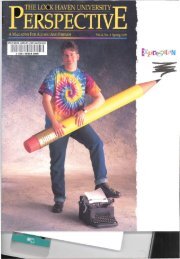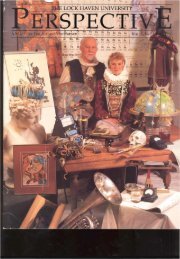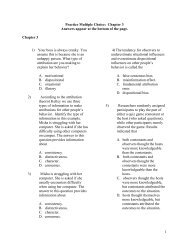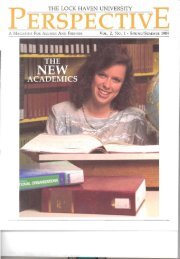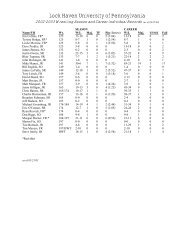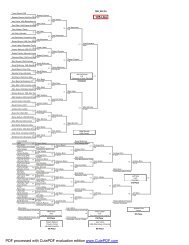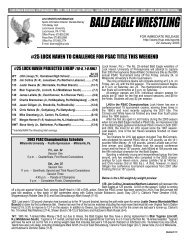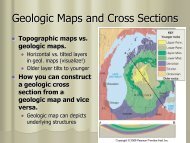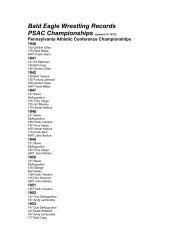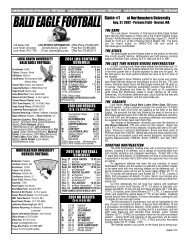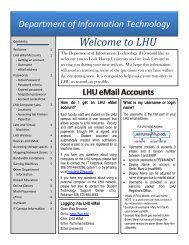February - Lock Haven University
February - Lock Haven University
February - Lock Haven University
You also want an ePaper? Increase the reach of your titles
YUMPU automatically turns print PDFs into web optimized ePapers that Google loves.
Page 3<br />
<strong>Lock</strong> <strong>Haven</strong> APSCUF News and Views<br />
Volume 08/09, Issue 6<br />
Classic Databases: Polling the Nations: The Ultimate Survey Database<br />
Most databases to which we subscribe are either created by or are bought out by big companies. Ebsco.<br />
Thompson/Gale. Cambridge Scientific. ProQuest. And then there is Polling the Nations (PTN). When<br />
opening it up for the first time, the look of this small-time database is immediately apparent. It’s like comparing<br />
the sophisticated marketing that goes into a bottle of Minute Maid orange juice with a hand written sign<br />
over the neighbor’s kid’s orange juice stand. But despite its amateur-like appearance, PTN is a very impressive<br />
database.<br />
PTN has been around since the mid eighties. For years, it was a strictly lo-tech operation, with a<br />
yearly print index accompanied by lots of microfiche. You would search the index by topic, but the actual<br />
questions, results, how it was distributed, and number of respondents would be on the microfiche.<br />
Several years ago PTN went hi-tech, making both the index and all the polling data accessible online. Among<br />
its over 14,000 surveys, drawn from television networks, newspapers, associations, publications, corporations,<br />
colleges, & universities, are such notable polling firms as Roper, Gallup, Harris, CNN, ABC, NBC, CBS, PBS,<br />
USA Today, and the NYTs. The nature of the polls indexed normally focuses on social, political, and economic<br />
issues at an international, national, state or local level.<br />
All totaled, there are currently around a half million survey questions included in this database. You<br />
can either search by keyword or by topic, of which there are approximately 4,000 topics to choose from. In<br />
addition to searching by either of these methods, you can limit your search by date, universe, and source. By<br />
universe, it means one of three things: either by country, by state, or by a category called local. So for example,<br />
you could look for survey data surveys dealing with capital punishment and limit it to Australia, or to Arkansas,<br />
or even Anchorage. And limiting by source means that you can just view polls done by Roper or<br />
Gallup.<br />
What you will retrieve will be the survey question, followed by the results in percentages. With the<br />
results will be the Field Date (the date it was done), the Universe (who took part in it), Additional Information<br />
(details about whether it was via phone, or door to door, and the number who took part), and finally<br />
Contact Information in case you want to contact the company who took it. Finally, there are options that<br />
will graph the data for you, that will allow you to export the data, and that will enable you to see all the<br />
other questions in the survey.<br />
Especially for those of you who teach political science, sociology, communication, social work, or<br />
business, PTN can provide your students data that can bolster their speeches or research papers. Keep Polling<br />
the Nations in mind the next time you need good survey data!<br />
Rick Lilla<br />
The ideas expressed in this newsletter are those of the contributors, and not necessarily the views of APSCUF.



